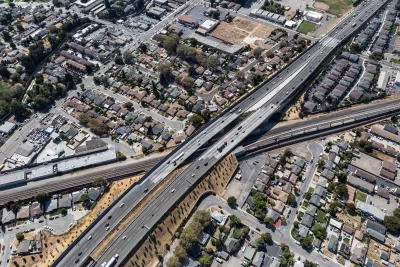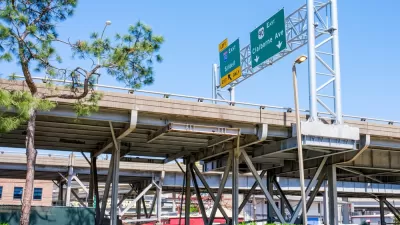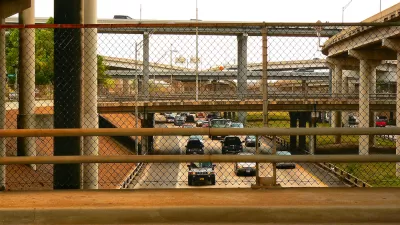The Biden administration has pledged to correct the damage imposed on communities by highways and infrastructure, but many projects are only committing to minor improvements, not transformative changes.

Recognizing the impacts of rampant highway construction and other infrastructure on urban neighborhoods and communities of color, the Reconnecting Communities Act and other recently created federal programs aim to redress the damage. Writing in The New York Times, Mark Walker describes the Biden administration’s efforts “to address racial disparities resulting from how the United States built physical infrastructure in past decades.”
As Walker explains, “The Transportation Department has awarded funding to dozens of projects under the goal of reconnecting communities, including $185 million in grants as part of a pilot program created by the $1 trillion bipartisan infrastructure law.” But “Once you wreck a community, putting it back together is much more work than just removing an interstate,” says Transportation for America director Beth Osborne.
Walker describes one such effort in Kansas City, where $5 million in federal funding is fueling planning for pedestrian overpasses and transit infrastructure to improve conditions around U.S. Highway 71, which “displaced thousands of residents and cut off predominantly Black neighborhoods from grocery stores, health care and jobs.” The city doesn’t envision removing the highway altogether, but rather adding connections to safely link the neighborhoods on either side.
FULL STORY: Highways Have Sliced Through City After City. Can the U.S. Undo the Damage?

Planetizen Federal Action Tracker
A weekly monitor of how Trump’s orders and actions are impacting planners and planning in America.

Congressman Proposes Bill to Rename DC Metro “Trump Train”
The Make Autorail Great Again Act would withhold federal funding to the system until the Washington Metropolitan Area Transit Authority (WMATA), rebrands as the Washington Metropolitan Authority for Greater Access (WMAGA).

The Simple Legislative Tool Transforming Vacant Downtowns
In California, Michigan and Georgia, an easy win is bringing dollars — and delight — back to city centers.

The States Losing Rural Delivery Rooms at an Alarming Pace
In some states, as few as 9% of rural hospitals still deliver babies. As a result, rising pre-term births, no adequate pre-term care and harrowing close calls are a growing reality.

The Small South Asian Republic Going all in on EVs
Thanks to one simple policy change less than five years ago, 65% of new cars in this Himalayan country are now electric.

DC Backpedals on Bike Lane Protection, Swaps Barriers for Paint
Citing aesthetic concerns, the city is removing the concrete barriers and flexposts that once separated Arizona Avenue cyclists from motor vehicles.
Urban Design for Planners 1: Software Tools
This six-course series explores essential urban design concepts using open source software and equips planners with the tools they need to participate fully in the urban design process.
Planning for Universal Design
Learn the tools for implementing Universal Design in planning regulations.
Smith Gee Studio
City of Charlotte
City of Camden Redevelopment Agency
City of Astoria
Transportation Research & Education Center (TREC) at Portland State University
US High Speed Rail Association
City of Camden Redevelopment Agency
Municipality of Princeton (NJ)





























